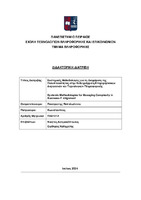Συστημικές μεθοδολογίες για τη διαχείριση της πολυπλοκότητας στην ευθυγράμμιση επιχειρησιακών διεργασιών και τεχνολογιών πληροφορικής
Systemic methodologies for managing complexity in business-IT alignment

View/
Keywords
Business-IT alignment ; Systemics ; Complexity ; Ευθυγράμμιση ; Πληροφορική ; Διεργασίες ; ΠολυπλοκότηταAbstract
Business-IT Alignment represents how and to what extent Information Technology aligns with an organisation's functions so that, as a unified entity, they support its vision and mission. It is a timeless issue that significantly affects the effectiveness of modern organisations.
The interaction of people, processes, and technology forms a soft socio-technical system dominated by emergent, non-deterministic behaviours, resulting in situations of high complexity. Investigating various aspects of the alignment between process and IT reveals the systemic character of this issue and necessitates the adoption of social and systemic approaches.
Executives involved in business-IT alignment represent interests and perceptions that often diverge, leading to disagreements about selecting and prioritising actions. To achieve consensus, we adopt systemic methodologies, some of which aim at participatory understanding and collaboration through creating models and others that are most proper for exploring the ultimate purpose and appropriate leverage points in digital transformation projects.
In this thesis, understanding the context of a process as a system that includes information systems, other processes, organisational entities, and the interaction relationships among them is of high value in exploring the relationship between processes and technology. A graphical notation is implemented and proposed for modelling this environment as a system based on systemic and cybernetic approaches while integrating established process modelling practices. A prototype software complements the proposed notation, being the means to implement this in practice.
Since business-IT alignment is not a static situation, this research explores its dynamic nature and how it contributes to organisational resilience. A disruption in the ability of information systems to support the organisation's processes jeopardises the implementation of its strategy, while the ability to recover determines its sustainability. System dynamics, combined with elements from cybernetics, are used to create a model that describes and simulates an organisation's adaptive behaviour after a disruption in the adequacy of information systems.
Collaboration and co-understanding through models, modelling process-based socio-technical systems, and understanding the dynamic nature of the relationship between technology and processes constitute this thesis's conclusion and the proposals for using systemic methodologies in the issue of business-IT alignment.


